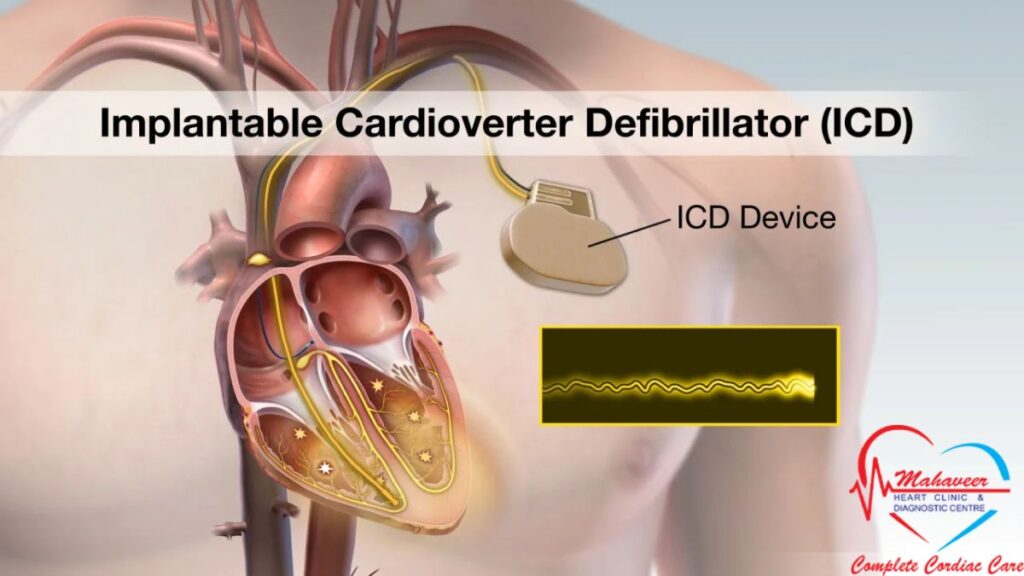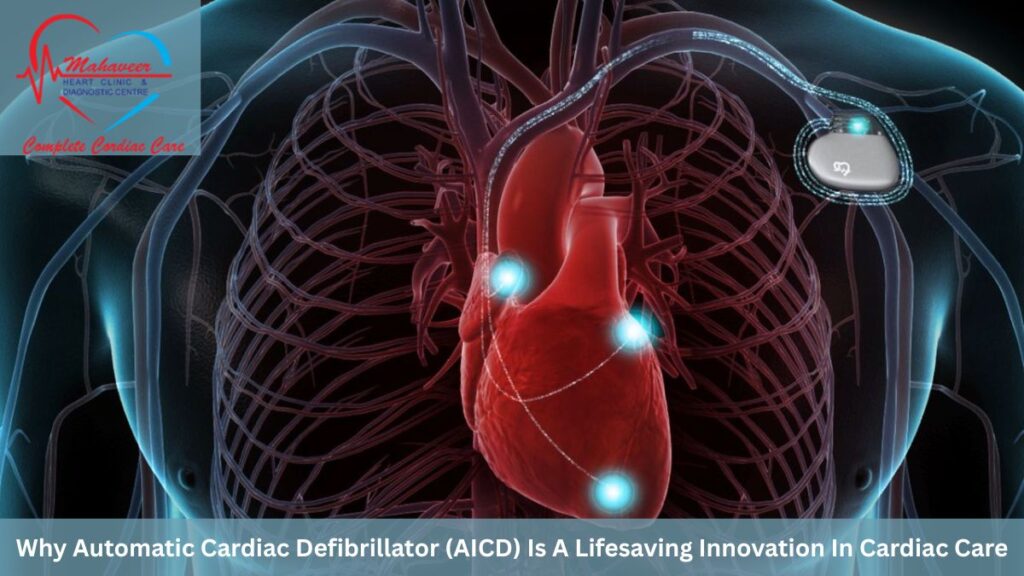What is an Automatic Cardiac Defibrillator (AICD) and Its Functions?
An Automatic Cardiac Defibrillator (AICD), also called an Implantable Cardioverter Defibrillator (ICD), is a highly sophisticated and compact device designed to prevent sudden cardiac death. Implanted surgically beneath the skin, typically in the upper chest near the collarbone, the AICD continuously monitors the heart’s rhythm. If it detects an abnormally fast, irregular, or potentially fatal heartbeat—particularly ventricular tachycardia or ventricular fibrillation—it delivers an electric shock to restore a normal rhythm. Dr. Rakesh Jain offers expert heart surgery in Indore, along with AICD implantation and complete cardiac care with advanced, patient-focused treatment
This life-saving device consists of two main components: a pulse generator (which includes the battery and circuitry) and insulated wires called leads that connect to the heart. The pulse generator collects and interprets electrical signals from the heart, and if necessary, responds with an electrical impulse. Some models also offer pacemaker functions, ensuring treatment for both slow and fast arrhythmias.
Patients in Indore who are at risk of serious heart rhythm disorders are increasingly being advised to consider AICD implantation. Dr. Rakesh Jain, one of the leading cardiologists in the region, provides expert consultation and surgical intervention for patients requiring heart surgery in Indore. His experience and specialization in electrophysiology and cardiac device therapy make him a trusted name in cardiac care.
Who Should Consider Heart Surgery in Indore For an AICD Implantation? Insights by Dr. Rakesh
AICDs are generally recommended for individuals at a high risk of life-threatening ventricular arrhythmias. These include patients who:

- Have survived sudden cardiac arrest.
- Have previously experienced dangerous episodes of ventricular tachycardia or fibrillation.
- Have cardiomyopathy or heart failure with significantly reduced ejection fraction (typically less than 35%).
- Have inherited arrhythmia syndromes like Long QT Syndrome, Brugada Syndrome, or Arrhythmogenic Right Ventricular Cardiomyopathy.
Implantation of an AICD becomes a preventive measure that significantly lowers the risk of sudden death from cardiac events. People who have previously suffered from severe heart conditions or have strong family histories of cardiac arrest are often the primary candidates.
In Indore, many patients consult Dr. Rakesh Jain to evaluate whether an AICD is appropriate for their specific condition. His advanced diagnostics and patient-specific approach help those undergoing heart surgery in Indore to receive not only treatment but also education on living a better quality of life with an AICD.
What Are the Benefits of AICD Implantation?
The most significant benefit of AICD implantation is the immediate and automatic response to life-threatening arrhythmias, which dramatically increases survival chances. Patients also benefit in the following ways:
- Round-the-Clock Monitoring: The AICD continuously tracks heart rhythms, ensuring timely intervention even if the patient is unaware of abnormal activity.
- Peace of Mind: Patients and families gain reassurance knowing there’s an in-built system to manage unforeseen cardiac emergencies.
- Integration with CRT: In patients with heart failure, AICDs are often combined with cardiac resynchronization therapy (CRT), enhancing both rhythm and pumping efficiency.
- Custom Responses: Modern AICDs can be programmed to deliver shocks or pacing tailored to individual patient needs, minimizing discomfort and maximizing effectiveness.
Those who undergo heart surgery in Indore and receive an AICD find their quality of life improved not only through physical health benefits but also by alleviating the constant fear of sudden cardiac events.
What Are the Risks and Considerations Associated with AICD?
While AICD implantation is generally safe and well-tolerated, there are a few potential risks and factors that patients need to consider:
- Infection at the Implant Site: Like all surgical procedures, there is a small risk of infection.
- Lead Displacement or Failure: The leads that connect the generator to the heart may shift or malfunction over time.
- Inappropriate Shocks: Rarely, the device may deliver a shock in response to a non-life-threatening arrhythmia or due to device misinterpretation.
- Psychological Effects: Some patients feel anxiety or depression related to living with a medical device.
Close and continuous follow-up with a cardiologist is essential to ensure that the device remains functional and complications are addressed swiftly. Dr. Rakesh Jain provides specialized post-operative care, helping patients in Indore who have undergone heart surgery in Indore adjust to life with an AICD and monitor their ongoing heart health effectively.
How Is the AICD Implantation Procedure Performed?
The implantation of an AICD is typically performed in a hospital’s cardiac electrophysiology lab under local anesthesia with mild sedation. The steps involve:
- A small incision is made near the collarbone.
- One or more leads are guided through the veins into the heart under X-ray guidance.
- These leads are then connected to the pulse generator, which is implanted just beneath the skin.
- Once connected, the device is tested to ensure proper function before the incision is closed.
The entire process usually takes 1–2 hours. Most patients stay overnight for observation and can return to their routine activities within a few days, with minor activity restrictions for the first few weeks.
Those undergoing heart surgery in Indore are often guided through this procedure by experts like Dr. Rakesh Jain, who ensures a seamless and safe experience from diagnosis to post-operative care.
What Is the Long-Term Outlook for Patients with an AICD?
Living with an AICD has become increasingly manageable due to technological improvements and better patient education. Most individuals return to a relatively normal life, with minor lifestyle adjustments.
Long-term considerations include:
- Battery Life: Most devices last 5 to 10 years. Regular check-ups will determine when replacement is necessary.
- Avoiding Electromagnetic Interference: Patients should steer clear of powerful magnets and electrical fields that might interfere with the device.
- Medical Awareness: It is vital to inform all healthcare professionals about the device before undergoing any diagnostic or surgical procedures.
- Physical Activity: After recovery, most patients can resume light to moderate physical activities. Some may even return to sports with physician guidance.
In Indore, follow-up care is provided by experienced cardiologists like Dr. Rakesh Jain, whose individualized treatment plans ensure that those who’ve had heart surgery in Indore enjoy safe and productive lives post-implantation.
How Does AICD Technology Continue to Evolve?
The field of cardiac electrophysiology is rapidly evolving, and AICDs are becoming smarter, smaller, and more efficient:
- MRI-Compatible Devices: Newer AICDs can now be safely used with MRI scanners, increasing diagnostic options.
- Wireless and Remote Monitoring: Physicians can now access patient data and device performance remotely, allowing quicker interventions and fewer hospital visits.
- Leadless Defibrillators: Research and trials are ongoing into entirely leadless AICDs that reduce surgical complexity and post-operative risks.
- Longer Battery Life: Innovations in battery and circuitry design mean modern AICDs can last longer than older models, reducing the frequency of replacement surgeries.
Dr. Rakesh Jain stays updated with the latest global advancements in this field, ensuring that patients undergoing heart surgery in Indore have access to the most modern and safest AICD technologies available.
Conclusion
The Automatic Cardiac Defibrillator (AICD) has revolutionized the prevention of sudden cardiac death. It offers round-the-clock protection for high-risk patients and significantly reduces mortality rates associated with dangerous arrhythmias. For those who meet the criteria, an AICD can be a lifesaving investment in their future health.With technological advancements and comprehensive post-implantation care, patients can now live healthier, more confident lives. In Indore, Dr. Rakesh Jain continues to be a guiding force for individuals considering AICD implantation. His commitment to quality cardiac care ensures that patients undergoing heart surgery in Indore not only survive but thrive.


